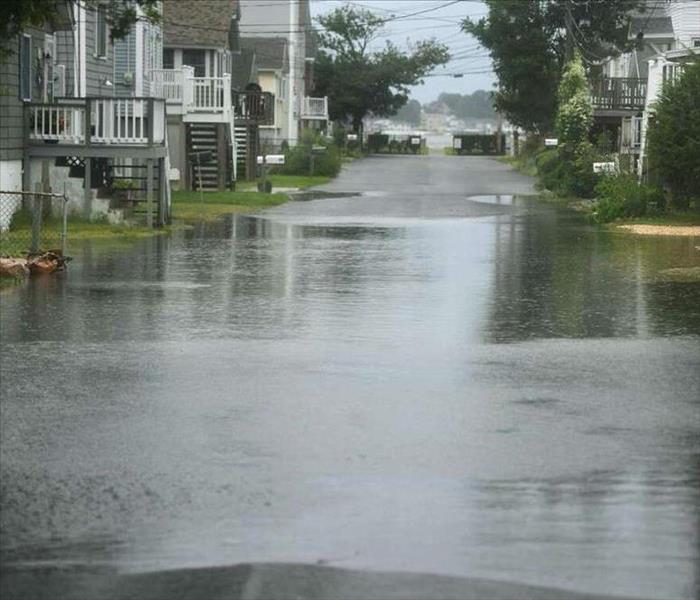Basement Water Damage - Skedaddle!
5/12/2022 (Permalink)
If you have a soggy basement, you're among the majority. The American Society of Home Inspectors estimates 60 percent of U.S. homes have wet basements, and 38 percent run the risk of basement mold.
1,000 Gallons for Every Inch of Rain
The water usually comes from rainfall and melting snow. Think about this: A house with a 1,500-square-foot roof sheds 1,000 gallons of water for every inch of falling rain. You may also have rising groundwater, which may even be fed by an underground spring. Once the water accumulates around your foundation, it works its way inside through cracks, joints, and porous material.
Before you call SERVPRO of Glastonbury/Wethersfield you may want to try tackling the problem on your own. Here are some tips on drying out your basement and keeping it free from water damage. If you feel like you’re in over your head or want some expert backup on your team, call our office at 860-633-8971.
Safety First
Is it safe for you to tackle the water damage? If you’re not sure, don’t take a chance. Find somewhere else to stay and call in the professionals until you’re certain your house is safe again.
One way to judge the safety issue is finding out whether you have electrical or "slip and fall" hazards. Don’t walk through your water damaged basement if you can’t see what you’re walking on. Stay out of areas that lack sufficient lighting. And if you try lifting wet materials be careful. When items are soaked with water they become very heavy.
If You Have Water Damage Call SERVPRO Of Glastonbury/Wethersfield At 860-633-8971
Water Damage from Runoff
If you know the water damage is from runoff the probable cause is rainwater or melted snow that isn't routed away from your house. A damp crawl space or wet basement walls and floors just after a storm or as snow melts are telltale signs the problem is runoff. Runoff percolates through porous topsoil and then stops at the compact soil near the base of the foundation. Hydrostatic pressure forces the water through gaps or cracks in walls and footings. Water also moves through porous walls by capillary action.
Carefully inspect your basement, looking for where runoff can enter. Check that the ground outside your basement foundation slopes away from your house at least one inch vertically for every foot of horizontal travel. Be sure downspout runoff isn't pooling or percolating into the soil near your home’s foundation during a storm, and that downspout seams aren't leaking.
Fix Cracks
Patch and seal any cracks you find in your basement walls or foundation. Use a polyurethane masonry caulk for small cracks. For 1/4-inch or larger cracks, use hydraulic cement, which expands as it dries.
Your driveway curbs should channel rain and other runoff to the street, not onto your property. You can also check for unsealed cracks in your driveway. Driveway cracks can allow water to collect below grade.
If You Have Water Damage Call SERVPRO Of Glastonbury/Wethersfield At 860-633-8971
We know of one homeowner who had basement water damage because the property needed a swale. Houses on hilly sites can use a shallow trench with gently sloping sides, a swale to catch and divert runoff away from the house. Once this homeowner created a swale the basement water damage stopped.
More Water Damage Information On Our Blog
You can learn more by reading other posts about water damage on our blog and the blog of our sister franchise, SERVPRO of Bloomfield/Enfield:
Safety After A Water Damaged Basement
Saving Water Damaged Electronics
Clean Up Your Glastonbury Water Damage FAST!
Check Your Home's Vulnerable Plumbing To Prevent Leaks and Floods
Help Is Here
The team at SERVPRO of Glastonbury/Wethersfield has specialized training and experience in fire restoration services, natural disaster prevention, water damage, biohazard cleanup, and natural disaster cleanup. Call SERVPRO of Glastonbury/Wethersfield at 860-633-8971 any time. We have someone standing by to take your call and be faster to your disaster.






 24/7 Emergency Service
24/7 Emergency Service
